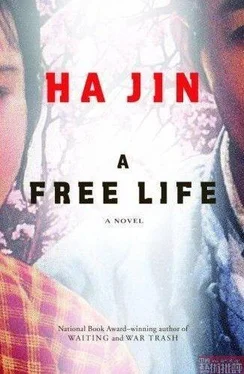She sobbed again, this time louder. Nan put his hand on her shoulder and whispered, "Don't be so sad. In this place we have to be tough, and have to endure a lot of humiliation. Sometimes you even have to swallow a tooth knocked off your gum."
" But I never thought my fellow countryman would…do…do this to me!" she panted.
"A man like him, not daring to hurt whites or blacks, can only turn on the Chinese." He removed his hand from her shoulder and sighed.
" Can you come and stay with me tonight? " she asked, and her eyes dimmed. "I feel so lonely, also frightened. Nobody cares about me here. My roommates are not in tonight and the apartment feels deserted. Please come with me. I'll be nice to you."
"Yafang, you're too emotional to think clearly. You're a good woman and will recover from this. I can't go to your place tonight. That will amount to taking advantage of you, and later you'll despise me. "
She nodded, her head hanging low. "You misunderstood me. I meant to invite you to stay in our living room. I'd just want to have someone in my apartment. I'm scared."
"Forgive me for what I said then, but I can't come with you."
"I understand."
"Don't tell others about what happened to you unless you absolutely trust them. If you can't help it, call home and talk to your siblings."
"That I can't do. They'll tell my parents. So far I've always told them everything is excellent here."
"Then you can call me if you want to talk." "Thanks. I might."
She got off at Kingston-Throop avenues, dragging her feet away as if her body were suddenly too heavy for her.
That night Nan reviewed Yafang's story in his mind. He felt low and somewhat regretted not having gone with her, but he feared he might get entangled with her too deeply. His life was already a quagmire. At this point he didn't want to be involved with another woman, and he had to concentrate on his own survival and that of his family. The more he thought, the more tormented he was by the notion Pingping had often expressed, namely that it was more dangerous to mix with your own people than with strangers. Yafang's trouble proved that. Many of their compatriots here were desperate and wouldn't hesitate to harm one another. In Heng Chen's case, there must have been more to it than just taking advantage of Yafang. His wife's betrayal might have turned him into a misogynist. No, not exactly. He obviously still lusted after women. Perhaps he was so desperate and so cornered that he couldn't help but move fast to seduce a young woman. But afraid of lawsuits and retaliation, he could only prey on a new arrival from their native land.
Yafang never phoned Nan. At work she was polite to him but remained aloof. Nan knew he must have hurt her pride, and she might have felt he had left her in the lurch. He noticed that she talked a lot with Aimin and Chinchin. Several times he caught her wistful eyes glancing at him, but whenever he joined their conversation, she'd turn taciturn. She seemed to avoid speaking to him, though she did tell him that she very much enjoyed the issues of New Lines he had given her.
MR. LIU called and said his wife, Shaoya, had completed a short story. He wondered whether New Lines could use it. If they could, he would send it along right away. Nan told him, "By all means, we'd love to see it. What's it about?"
" About how hard a Chinese woman works in an underground sweatshop in New York."
"That's good. We probably can run it."
"Should I mail it to you?"
"No need. I'm going to the print center tomorrow morning, and I can stop by and pick it up. That will save you the postage."
"Thank you for your thoughtfulness, Nan. I'll see you then." Mr. Liu sounded tired, as though he'd lost some of his voice.
Nan told Bao about Shaoya's story. They both believed they should publish it provided she was willing to resume her pen name, Purple Lilac; yet they couldn't make the final decision until they had read it. Bao kept saying this was a good sign: some fiction might bolster the circulation of the journal.
The next morning Nan went to the Lius'. It took him a good while to find their apartment, because he wandered into a neighboring tenement that looked identical. Finally, as he was approaching the correct entrance, he heard a woman screaming in Chinese, but he couldn't make out her words. A black man ran out of the stairwell and almost barreled into Nan, who stepped aside to let him pass. The front of the man's canary yellow pullover bore the large words sick of it all! He nodded at Nan and sauntered away. Nan went to unit 127, and the female voice was intelligible now-it was Shaoya's.
"I've worked myself half to death to make the money while you just threw it away right and left," she shouted. "I didn't mean to," came Mr. Liu's tamed voice. "You must pay it back."
"You know I'm broke. If I had any money, you could have it all." "Stop playing the stock market! Do you hear me?" "Life is a risk. We-"
"Shut up! Just promise me never to do it again."
Should Nan go in? He decided to knock on the door. Mr. Liu answered and was surprised to see him. Then the old man grimaced, saying, "Come in, please." He spread out his arm as if ushering Nan to a meeting.
" Sorry, I understand this might not be a convenient time," Nan said.
"Don't worry. We're just having a small exchange of words. Right, dear?" he asked Shaoya, who still looked incensed, her face dark.
She said to Nan as if he were an old friend, "He dabbled in stocks with the sweat money I made. Yesterday alone he lost more than two thousand dollars."
"All right, all right," said her husband. "The stock market is like a battlefield where it's normal to lose or win. It highly depends on luck. Right, Nan?"
Nan was taken aback, totally ignorant of stocks. He forced himself to answer, "That must be true. Losses and gains take place every day."
"But he shouldn't have run the risk in the first place," she said. "Heaven knows how hard I've worked at the gift store. Last week I put in fifty-eight hours, and my legs got swollen every night when I came back. But he stayed home playing ducks and drakes with the money I made."
"All right, I won't do it again," said her husband.
Nan got the story and Shaoya's agreement to resume her pen name. on his way back he mulled over the scene at the Lius'. He was surprised that the old man would speculate in stocks. Everyone assumed that the Lius were poor, but Mr. Liu had just lost thousands of dollars. How could that be possible? Had he accepted some financial aid on the sly? Probably. Otherwise he wouldn't have squandered money that way.
On second thought, Nan was unsure of his reasoning. Mr. Liu had already established his image as an independent man; if he had taken money from someone, word would surely have come out, since the exile community was small and all eyes were focused on the funds available for the dissidents. No, the old man could hardly have accepted any financial aid without being noticed. Nan realized that Mr. Liu's apparent self-reliance was based mainly on his wife's hard work and sacrifice.
BAO knew a famous poet, Sam Fisher, who lived in the Village. He had invited Fisher to be on the honorary board of New Lines and the poet had agreed. The journal listed his name, together with several others, on the inside of its back cover. Bao also requested poems from Fisher, who was so generous that he said he'd give him three or four. One Sunday morning Bao and Nan set out for the poet's place to get the poems.
Fisher lived in a yellow-brick building on West Tenth Street. He greeted Bao and Nan with a little bow, his arm opened toward the inside of his apartment. He looked sleepy, but his droopy eyes were intense, as if they could bore into your mind when he peered at you. His crown was entirely bald, yet the hair at his temples curved upward like two tiny horns. His home was rather crowded, the walls lined with bookcases and many large photographs, some of which showed naked young men in different postures. One displayed a teenage boy sitting on his haunches and holding his erected member with his hand as if masturbating. Sam Fisher was also an accomplished photographer, selling his pictures to collectors regularly. In addition, he was a Zen Buddhist. On the wall of the corridor hung a long horn, the type used at Tibetan temples. He led the visitors into the living room, which smelled bosky and had a shiny floor, and then he called to his boyfriend to brew tea.
Читать дальше












